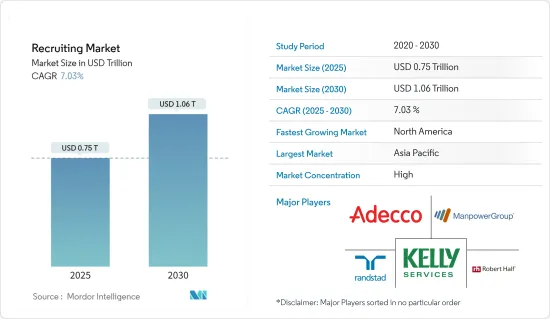PUBLISHER: Mordor Intelligence | PRODUCT CODE: 1651073

PUBLISHER: Mordor Intelligence | PRODUCT CODE: 1651073
Recruiting - Market Share Analysis, Industry Trends & Statistics, Growth Forecasts (2025 - 2030)
The Recruiting Market size is estimated at USD 0.75 trillion in 2025, and is expected to reach USD 1.06 trillion by 2030, at a CAGR of 7.03% during the forecast period (2025-2030).

In recent years, technological advancements, evolving candidate expectations, and shifts in the global economy have significantly transformed the recruiting market. The surge in remote work has broadened the talent pool, enabling companies to recruit on a global scale. Organizations are emphasizing diverse hiring practices to foster more inclusive workplaces. Applicant tracking systems (ATS) and AI-driven recruiting platforms are streamlining the hiring process.
Many industries, incredibly tech, healthcare, and engineering, are grappling with skills shortages, intensifying the competition for qualified candidates. To attract top talent, companies are investing in employer branding, highlighting their culture, values, and employee testimonials. The gig economy's expansion sees more professionals leaning towards freelance or contract work, reshaping corporate talent acquisition strategies. Economic shifts, be it recessions or booms, influence hiring practices; downturns often lead companies to scale back hiring or prioritize employee retention. Moreover, video interviews, virtual job fairs, and social media recruitment are becoming standard practices.
Recruiting Market Trends
Rising Demand for IT Services Fuelling Market Growth
Organizations are increasingly embracing digital transformation to boost efficiency and competitiveness. This transition is heightening the demand for skilled IT professionals, subsequently driving up the need for recruitment services. With the shift to remote work, the talent pool for IT roles is expanding, prompting companies to seek recruiters adept at sourcing candidates from varied geographical areas. Technologies like artificial intelligence, cloud computing, and cybersecurity are evolving rapidly, underscoring the demand for specialized talent. Recruiters are now challenging to identify candidates possessing these niche skills. Given the tech industry's propensity for high turnover rates, companies are turning to recruiters for swift and efficient placements, ensuring a steady demand for recruitment services. As businesses are bolstering their IT capabilities, the competition for skilled professionals are sharpening. Recruiters are pivotal in aiding companies to attract and retain elite talent. With companies ramping up investments in IT infrastructure and services, new roles are emerging, necessitating recruiters to navigate this surge in hiring demands.
Asia-Pacific's Growing Recruitment Market is Fuelling the Industry Forward
Asian countries are witnessing rapid economic growth, which is pioneering an increasing demand for skilled labour in sectors like technology, finance, and healthcare. However, despite a burgeoning workforce, significant skill gaps are persisting in crucial domains like IT, engineering, and digital marketing. This deficiency is driving companies to turn to specialized recruitment services in their quest for qualified candidates. These emerging companies are adopting agile recruitment strategies to secure talent, thereby energizing the recruitment market swiftly. As remote work and flexible job arrangements gain traction, companies are expanding their horizons beyond local talent pools. In response, recruitment agencies are embracing cross-border hiring strategies, broadening their service offerings. Furthermore, businesses across the Asia Pacific are increasingly valuing employer branding as a tool to lure top-tier talent, with recruitment firms playing a pivotal role in helping them craft robust brand identities.
Recruiting Industry Overview
The Recruiting market is consolidated. During the forecast period, the market is poised for growth, intensifying market competition. The competitive landscape includes all the strategies players use to maintain their market share globally, such as acquisitions and mergers. The major players in the market include Randstad, Adecco, ManpowerGroup, Robert Half, and Kelly Services.
Additional Benefits:
- The market estimate (ME) sheet in Excel format
- 3 months of analyst support
TABLE OF CONTENTS
1 INTRODUCTION
- 1.1 Study Assumptions and Market Definition
- 1.2 Scope of the Study
2 RESEARCH METHODOLOGY
3 EXECUTIVE SUMMARY
4 MARKET DYNAMICS
- 4.1 Market Overview
- 4.2 Market Drivers
- 4.2.1 Technology's Ascendancy is Revolutionizing Recruitment Approaches
- 4.2.2 Job Seekers are Prioritizing Value Alignment with Prospective Employers
- 4.3 Market Restraints
- 4.3.1 Talent Shortages Restrain Market Growth
- 4.3.2 Intense Competition Limits Market Expansion
- 4.4 Market Opportunities
- 4.4.1 Social Media Recruiting Opens New Doors
- 4.5 Value Chain / Supply Chain Analysis
- 4.6 Porters 5 Force Analysis
- 4.6.1 Threat of New Entrants
- 4.6.2 Bargaining Power of Buyers/Consumers
- 4.6.3 Bargaining Power of Suppliers
- 4.6.4 Threat of Substitute Products
- 4.6.5 Intensity of Competitive Rivalry
- 4.7 Insights on Technological Innovations in the Market
- 4.8 Impact of COVID-19 on the Market
5 MARKET SEGMENTATION
- 5.1 By Industry
- 5.1.1 Technology
- 5.1.2 Healthcare
- 5.1.3 Finance
- 5.1.4 Manufacturing
- 5.1.5 Retail and Hospitality
- 5.2 By Experience Level
- 5.2.1 Entry-Level
- 5.2.2 Mid-Level
- 5.2.3 Senior-Level
- 5.3 By Employment
- 5.3.1 Full-Time
- 5.3.2 Part-Time
- 5.3.3 Contract/Freelance
- 5.4 By Demographic
- 5.4.1 Age
- 5.4.2 Education Level
- 5.4.3 Gender and Diversity
- 5.5 Geography
- 5.5.1 North America
- 5.5.1.1 US
- 5.5.1.2 Canada
- 5.5.1.3 Mexico
- 5.5.1.4 Rest of North America
- 5.5.2 Europe
- 5.5.2.1 Germany
- 5.5.2.2 UK
- 5.5.2.3 France
- 5.5.2.4 Russia
- 5.5.2.5 Spain
- 5.5.2.6 Rest of Europe
- 5.5.3 Asia Pacific
- 5.5.3.1 India
- 5.5.3.2 China
- 5.5.3.3 Japan
- 5.5.3.4 Rest of Asia Pacific
- 5.5.4 South America
- 5.5.4.1 Brazil
- 5.5.4.2 Argentina
- 5.5.4.3 Rest of South America
- 5.5.5 Middle East
- 5.5.5.1 UAE
- 5.5.5.2 Saudi Arabia
- 5.5.5.3 Rest of Middle East
- 5.5.1 North America
6 COMPETITIVE LANDSCAPE
- 6.1 Market Concentration
- 6.2 Company Profiles
- 6.2.1 Randstad
- 6.2.2 Adecco
- 6.2.3 ManpowerGroup
- 6.2.4 Robert Half
- 6.2.5 Kelly Services
- 6.2.6 Hays
- 6.2.7 Allegis Group
- 6.2.8 Korn Ferry
- 6.2.9 Michael Page
- 6.2.10 LinkedIn Talent Solutions*
7 MARKET FUTURE TRENDS
8 DISCLAIMER AND ABOUT US




